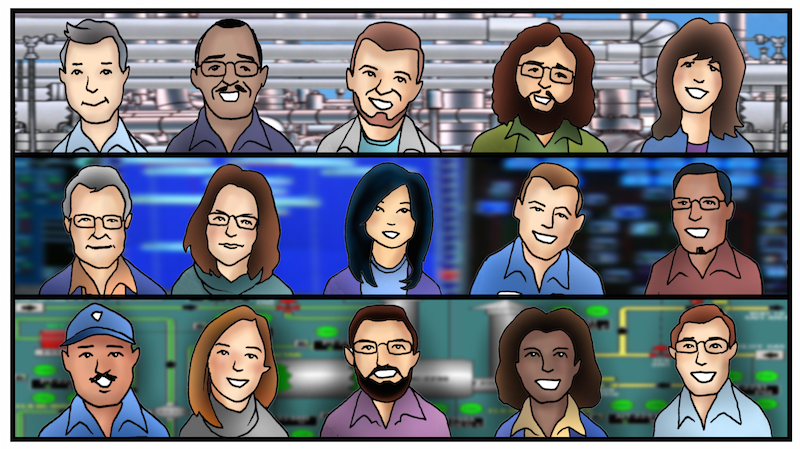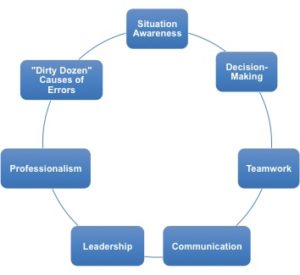Control Room Team Training is mentioned in a 2015 PHMSA proposed rule, along with multiple other subjects about pipeline safety. Team training can be a wide-open subject. I have been involved with team training at pipeline companies since the 1990s when the company where I worked decided we would practice teamwork. I am using the term “Team Resource Management” to align with the term “Crew Resource Management,” which is used in other transportation modes to describe training in teamwork and non-technical skills.
I plan to write monthly articles about Team Resource Management this year. The reason I am writing about Team Resource Management is because of the statement below from the “PHMSA Notice of Proposed Rule Making (Docket No. PHMSA-2013-0163) Pipeline Safety: Operator Qualification, Cost Recovery, Accident and Incident Notification, and Other Pipeline Safety Proposed Changes.”
It was issued on July 10, 2015 and contains this proposed change to the CRM regulations in “Training” section requirements. If the change is approved, it will require:
- 446 (h)(6) and 192.631 (h)(6) Control room team training that includes both controllers and other individuals who would reasonably be expected to interact with controllers (control room personnel) during normal, abnormal or emergency situations.
This proposed rule would require “Control Room Team Training.” The NTSB had issued a recommendation to PHMSA on July 25, 2012 that stated:
- Develop requirements for team training of control center staff involved in pipeline operations similar to those used in other transportation modes.
PHMSA first addressed the NTSB recommendation May 6, 2014 with the Advisory Bulletin (ADB–2014–02) Integrity Management Lessons Learned from the Marshall, Michigan Release:
- PHMSA advises operators to regularly train their control room teams and consider establishing a program to train control center staff as teams in the recognition of and response to emergency and unexpected conditions that include supervisory control and data acquisition indications and leak detection software.
If one looks at those three statements, it leads to questions:
- What subjects should be included in “control room team training?”
- Who are these “individuals who would reasonably be expected to interact with controllers?”
- What team training is “used on other transportation modes?”
My first training teamwork training experiences was about team formation, including the stages below:
 I have painful memories of the forming, storming, and norming stages, but eventually some of the teams achieved the performing stage. In the 1990s some said we were already teams. My reply was that we were more like a pack of dogs fighting over the same bone. I hope that is not how it is in your organization. An appropriate first step in control room team training might be to determine the current state of the team. It can be difficult to achieve excellent teamwork in a control room with rotating shifts since the people do not see one another regularly. That is why it is important to have clear statements of roles and responsibilities, protocols for decision-making and communication, and statements of team norms that are meaningful to all team members and to those who support the control room team.
I have painful memories of the forming, storming, and norming stages, but eventually some of the teams achieved the performing stage. In the 1990s some said we were already teams. My reply was that we were more like a pack of dogs fighting over the same bone. I hope that is not how it is in your organization. An appropriate first step in control room team training might be to determine the current state of the team. It can be difficult to achieve excellent teamwork in a control room with rotating shifts since the people do not see one another regularly. That is why it is important to have clear statements of roles and responsibilities, protocols for decision-making and communication, and statements of team norms that are meaningful to all team members and to those who support the control room team.
I believe control room team training should include subjects that will equip individuals with non-technical skills. Based on what is used for training in other transportation modes, here are some of the subjects we will be including in our Team Resource Management classroom training courses.
The individuals who could be included in control room team training include controllers, managers, SCADA personnel, leak detection personnel, and support personnel who regularly request information and/or provide information to controllers. The illustration on the first page shows people who may work in control rooms, in the SCADA department, or on the pipeline or at terminals. In some organizations, field personnel and/or their managers might need to have a better understanding for how their work affects the performance of the control room. Hardly anyone is going to want to participate in additional training, and these non-technical skills are what some term “soft skills.” Hardheaded and tough pipeliners do not want to talk about soft skills.
In other transportation modes, the concept of Crew Resource Management or CRM is commonly used. It originated in aviation and was once named Cockpit Resource Management. It seemed that pilots and copilots did not always work well together. As stated on the FAA website, “Crew Resource Management can be traced to the early 1970s following a series of deadly accidents. Researchers discovered that it was not mechanical failure causing a vast majority of accidents but rather pilot/crew error.” These errors included failures in interpersonal communication, leadership, and decision-making in the cockpit. Now there are requirements in aviation, the rail industry, the marine industry, health care, mining, oil and gas, firefighting and the military for some type of crew resource management programs. Training is only part of the solution if an industry wants to address human performance issues. The subjects in the diagram above are usually included in Crew Resource Management training, and the training content emphasizes the importance of having and using standard operating procedures.
Because pipeliners love acronyms and use the acronym CRM for Control Room Management, we will use Team Resource Management instead. I am sure we will use TRM. I will have more details on Team Resource Management in future articles, but now you know a few of the reasons control room team training may become an additional training requirement. We will introduce the Team Resource Management course at our half-day workshop March 3, 2016 in Atlanta. On March 1-2, we will have a two-day Control Room Management workshop. For registration and details about both workshops, visit our website: https://pipelineperformancegroup.com/blog/event/crm-workshop/.





